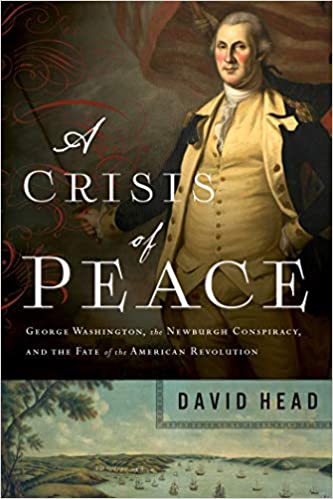Authors:
Historic Era: Era 3: Revolution and the New Nation (1754-1820s)
Historic Theme:
Subject:
Fall 2020 George Washington Prize | Volume 65, Issue 8


Authors:
Historic Era: Era 3: Revolution and the New Nation (1754-1820s)
Historic Theme:
Subject:
Fall 2020 George Washington Prize | Volume 65, Issue 8
Excerpted from the George Washington Book Prize finalist A Crisis of Peace: George Washington, the Newburgh Conspiracy, and the Fate of the American Revolution, by David Head (Pegasus Books).

On a cold morning in March 1783, the officers of the Continental Army read a letter that was circulating through their cantonment along the Hudson River. The officers considered the letter's call to do something soldiers weren't supposed to do: meet to discuss how to send an ultimatum to the civilian authorities in Congress.
Some 10,000 soldiers, the bulk of the Continental Army, stood duty in the region known as the Hudson Highlands, a strategically vital area overlooking the spot where the river narrowed. Most of the men lived in log huts constructed in the farmland to the west of New Windsor, nestled among places with such appealing names as Snake Hill and Murderers Creek. A dozen miles south, a garrison guarded the fort at West Point, while other units were scattered another dozen miles beyond at Stony Point and Verplanck's Point. The commander in chief, General George Washington, was headquartered in a Dutch-style stone house along the river in Newburgh, two miles north from the main body of his men. The American victory at Yorktown in October 1781 had bloodied the enemy and driven the British ministry to the bargaining table, but British forces in North America remained formidable, above all in New York City. If the British decided to renew the war and resurrect their old strategy of dividing the colonies along the Hudson, the American army was nearby.
The Highlands was also a place of sylvan solitude, conducive to contemplating life, and as the days slipped by and the drudgery of winter quarters dragged on for the eighth time in the war, the officers' thoughts turned to all they had sacrificed and the scant rewards they had enjoyed for it.
For eight years, the army was paid sporadically, and when it was, compensation was delivered in a mess of notes, certificates, and cash that had so depreciated that it was nearly worthless. In the wake of mass resignations and the treachery of Benedict Arnold in 1780, the officers had forced Congress to promise them pensions, but the treasury was empty--worse than empty: the nation was deeply in debt and the only way out, new taxes, was deeply unpopular. When the officers looked outside their ranks, they saw greedy civilians snug by their firesides. Civilian government employees were paid reliably, while soldiers hunkered down in the snow. The officers believed in the cause. They believed in independence. They believed in republican government and creating the world anew. But they also saw themselves as gentlemen, and gentlemen needed to live a certain lifestyle, surrounded by certain fine things, to display their status. For the men with families, serving during the prime of life had taken away their